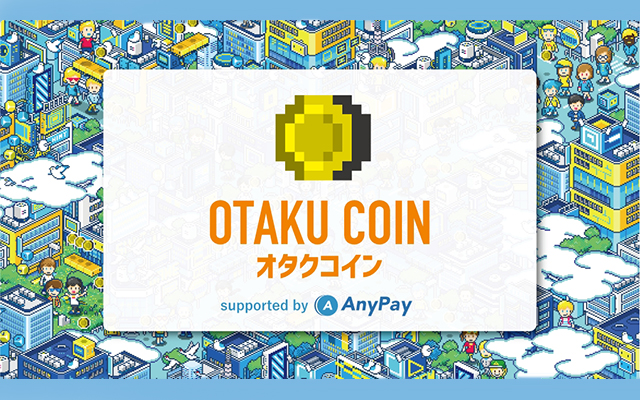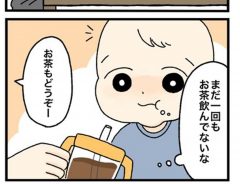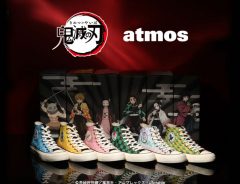
Source: © PR Times Inc. / © Otaku Coin Preparation Committee
Otaku Coin: The Cryptocurrency That Could Save the Otaku Industry – Interview (Part 1)
- Source:
- © PR Times Inc. / © Otaku Coin Preparation Committee / © Tokyo Otaku Mode Inc. / © The Association of Japanese Animators / © GENCO Inc.
- Tags:
- animated film / Anime / Anime Tamago / AnyPay / Crowdfunding / cryptocurrency / Film / Game / GENCO / Hajime Ataka / ICO / In This Corner of the World / Makuake / Manga / Otaku / Otaku Coin / The Association of Japanese Animators / Tokyo Otaku Mode / TOM / virtual currency
Related Article
-

Japan now has “coronavirus-fighting” beer, Amabie IPA, with a label by “Moyasimon” creator Masayuki Ishikawa
-

Modeler spends 4 years making Gundam diorama and it’s a work of art
-

Mother of toddler experiences first-hand the importance of first-aid training [manga]
-

Japanese streetwear maker releases Demon Slayer: Kimetsu no Yaiba character sneakers
-

Sailor Moon Theme Song Performed on Traditional Japanese Instruments Sounds Magical
-

Anime Fans Will Love The New Toei Animation Museum


Since the end of 2017 when they first made the announcement, Japanese pop culture news site and online store Tokyo Otaku Mode (TOM) has been working on a cryptocurrency project called Otaku Coin. According to the project website, Otaku Coin would circulate through the Japanese anime, manga and game industries, connecting fans with creators and relevant organizations in new and efficient ways. The project leaders hope that Otaku Coin will become the de facto standard currency for Japanese pop culture, contributing to the creation of an ecosystem where fans can directly contribute to and help to preserve the culture they love. TOM’s tentative plan is to have this ICO launched in spring or summer of 2018.
(Note: TOM does not guarantee that this ICO will be launched. As TOM continues to move forward, there is a possibility that unforeseen circumstances and issues, changes in the state of affairs in various countries, changes in public opinion toward ICOs, enactment of legal regulations and guidelines, or other unpredictable matters may arise.)
We visited the offices of Tokyo Otaku Mode in Shibuya, Tokyo, and sat down with co-founder/COO Hajime Ataka to ask him about his plans for Otaku Coin and to understand more about the specific ways in which the proposed currency would contribute to the otaku industry.
Source: © PR Times Inc. / © Tokyo Otaku Mode Inc.
Background Questions
grape Japan (gJ): Why did you choose to launch the Otaku Coin project at this particular moment in time?
Hajime Ataka (HA): Although cryptocurrency was a popular buzzword last year, the impression in the general public was that it was limited to fintech or with the most technologically savvy members of the population. (...) However, from now on and going forward in the next few years, I think cryptocurrency will really begin to take root in a more general sense. Take a look at Bic Camera (* Tokyo's largest electronics retailer) which announced they'd begin accepting Bitcoin payments last year. I think such cases will only increase.
At TOM, since we're a cross-border ecommerce operation selling anime, manga and game-related goods from Japan, we thought we could create a cryptocurrency which could be used in that situation. Word is that community-based currencies will facilitate the spread of cryptocurrency in the penetration phase. And when it comes to communities, otaku content, namely anime, manga and games, is very popular and many people are interested in it around the world. So we said to ourselves: We have strong connections abroad and a company operating within Japan. Maybe if we leveraged our connections with license holders and content-creating companies, we could make something great happen. Maybe we could use our position to ensure that such a cryptocurrency would spread. With that in mind, around October of last year, we began studying the subject, doing research, talking to people, and we realized that we may be able to make it work. That's why we decided to launch the project when we did.
First, we want to collect information, find out if there really is a need for such a currency, open up a forum where people can voice their opinions and write comments, and then decide on a direction to head in.
gJ: I see. And is Telegram your main forum for collecting information?
HA: We currently have a Facebook group and Telegram. Our Facebook group has fortunately had a good public response, and our membership grew to 2,000 in just about two weeks. With Telegram, we have about 1,000 participants both from Japan and abroad. As for one-way communication, we have a mail magazine with about 5,000 people registered outside of Japan and about 1,500 inside Japan. Thanks to these efforts, we're collecting opinions.
gJ: Looking at what happened with bitcoin, for example, some people may have the impression that cryptocurrency is unstable and a dangerous gamble. Is it possible that Otaku Coin will face similar problems?
HA: Just to confirm what you mean when you say unstable, are you talking about its high volatility, the fact its price goes up and down all the time?
gJ: Yes, that's I meant.
HA: If we were to implement right now, I think that would be a possibility, yes. However, our ultimate goal is to properly create a unified cryptocurrency for this community. If it's too volatile, then people won't be able to use it. It becomes a difficult situation. So, we absolutely need to come up with a solution to that problem. I think it also depends on how the system is designed.
Questions about the vision outlined on the Otaku Coin website
Source: © PR Times Inc. / © Otaku Coin Preparation Committee
gJ: On the Otaku Coin website, you talk about allowing fans to directly participate in and support anime production, creating services that would allow fans to locate content, etc. In other words, a much broader project far exceeding the scope of merely launching a new currency comes into view. So then, which came first? This larger project or Otaku Coin?
HA: Our vision, our mission when we established Tokyo Otaku Mode was to make the world happy through otaku culture. We've been in operation for nearly six years now, and throughout this time, we've always been thinking about how we can contribute to the industry. Our Facebook page now has 20 million fans, many of them outside of Japan. We've always thought of what actions we can take to get those fans, Japanese fans too, to appreciate Japanese anime, manga and game content and help spread it throughout the world.
Unfortunately, as it was mentioned in the Anime Industry Report 2017 (published by the Association of Japanese Animators), despite the popularity of anime, manga and game content abroad, bringing money back into Japan has been difficult for some time now. And with Japan's declining population, there's a danger that new content won't be made any more. From the beginning, we wanted to ensure the survival of the content industry by helping to create an ecosystem where fans can contribute to anime production, share and review works, where we can do projects working directly with creators, all of these things.
So, when we came up with the idea for Otaku Coin, it occurred to us that helping the currency to circulate and helping fans to participate more actively in content would benefit from the creation of such an ecosystem. So, to answer your question, the larger project came first but we thought the creation of Otaku Coin would be a good time to put it into action because we feel that they are connected.
gJ: In other words, the implementation of Otaku Coin would make it easier to realize the greater project.
HA: Yes, I believe so.
gJ: Your site mentions that anime production companies making pilot movies within this new ecosystem would benefit from an increase in revenue and improvement in the quality of their work. Are there other benefits for them?
HA: I think there are. One of the services we use as a reference is Anime Tamago, a project currently run by the Association of Japanese Animators. Although I don't have exact numbers, they give anime production companies anywhere between 30 and 50 million yen to subsidize the production of a 10 to 20 minute pilot movie. And maybe they make five of these a year and show them off to the public. I think this kind of thing needs to happen more often. Anime production companies get this money risk free, so that makes it easier for them to give young creators a chance. Also, they get to keep ownership of characters, licenses and copyrights. So, if people like the pilot and it becomes a TV anime or an animated film, and if they continue to develop the character, they can even make goods and earn more income.
This is really important because it's currently difficult, under the current system, for anime production companies to own the rights to their content. Only a few companies can do this. Therefore, I think we should increase projects like Anime Tamago.
gJ: In the section: "What fans can do with Otaku Coin," you've included "Support Projects." Do you mean anime crowdfunding projects?
HA: Well, I think there are several possible ways of doing it. That's one, but there are others as well. With Otaku Coin, we're talking about a cryptocurrency that circulates through the internet. By having currency transactions directly with creators, I think we could directly support them without even going through production companies.
But let me step back a bit to give you some context. Crowdfunding anime probably happens at most a few times a year, and there's a reason for it. Anime production companies are extremely busy, and that's not only creators but everyone in the company. Establishing a production committee and getting ten different companies to come to agreement is already difficult work. When it's only 10 companies in a production committee, the anime production company may have to deal with maybe 10 or 20 people at most. With a crowdfunding project, however, they have to deal with 2,000, or maybe even 10,000 fans. And when you consider that most of those fans have to be handled in English, industry insiders have told me it's just too much work. That's why anime crowdfunding projects are still very scarce. Anime production companies know that there are PR benefits and that it could allow fans to connect to the work in a more direct way, but they're reluctant to take the plunge because it's so daunting.
That's where we might be able to make a difference. We handle customer service in English 365 days a year, so we're used to that kind of interaction. Therefore, I'm not sure if it would be us or one of the Otaku Coin Preparation Committee partners but anime production companies could pay a fee to take care of that aspect and then go ahead with the crowdfunding. That way, maybe 5 to 10 anime works a year could open up to direct fan participation. And we think that Otaku Coin would enable this to happen.
gJ: In other words, it would give the anime industry currently faced with a sense of approaching a dead-end with a new way out, a new direction?
HA: We aren't proposing such a big revolution. What's important is to try new things. Take for example our advisor, Mr. Maki from GENCO, who succeeded in funding the film In This Corner of the World" on the Makuake crowdfunding platform. He started out showing the film in small theaters and sold out, then promoted the film on social networks. That's when it went viral and eventually enjoyed a long run. That's really ideal and I hope more examples like that can happen in the future. If anime production companies work with us and our partners collaborating in the Otaku Coin project, maybe we can overcome some of the difficulties. Getting extra help from fans all over the world can make our project even stronger.
Early next month, we'll bring you part 2 of our interview. If you'd like to learn more about the Otaku Coin project, please visit their official website here.